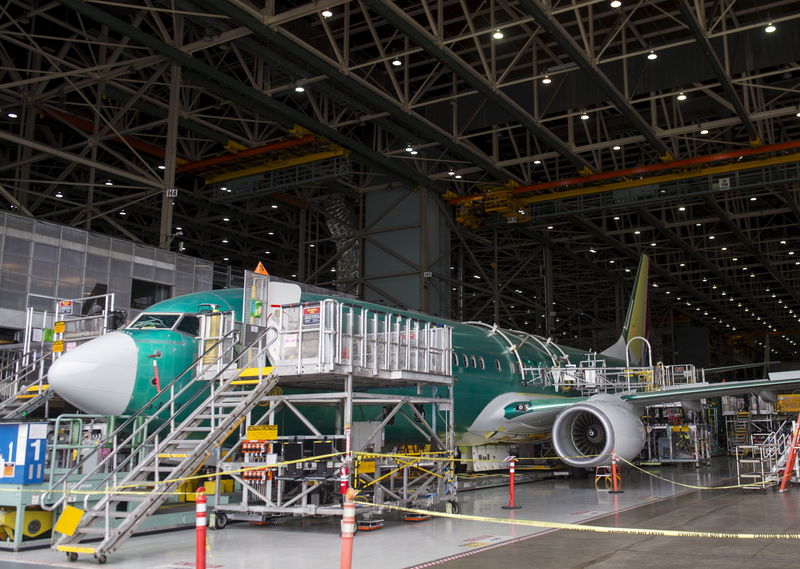David Shepardson
WASHINGTON (Reuters) – The Federal Aviation Administration will not immediately allow Boeing (NYSE:) to increase production of the 737 MAX as it deals with ongoing safety concerns, its administrator said on Thursday after a meeting with outgoing CEO Dave Calhoun and other executives.
The FAA’s enhanced oversight of Boeing will continue in the coming months, with weekly meetings and quarterly exchanges between company executives and the U.S. regulator. In February, the FAA barred the planemaker from increasing production of its best-selling plane after a door panel exploded during a Jan. 5 flight on the new 737 MAX 9.
FAA Administrator Mike Whitaker said he does not expect Boeing to receive approval to increase production of the MAX “in the next few months” and has not yet discussed the issue with Boeing.
He said the FAA will be monitoring Boeing in the coming months to understand quality and safety improvements “to give us a fundamental picture of whether they’re in the right zone… We want to make sure the system is performing as safely as it should.”
Late Thursday, Boeing released an 11-page summary of its improvement plan based on FAA audits and employee feedback and other sources, including the six safety-critical manufacturing areas it will address.
Key performance indicators include employee qualifications, number of hours spent solving problems, including total rework hours per aircraft, and supplier shortages.
Boeing said the data “will provide real-time information about the health of the production system, allowing the company to identify and address potential quality and therefore potential safety hazards before they fully mature.”
Production of the 737 MAX aircraft is vital to the company’s finances. Last week, the planemaker’s chief financial officer said it would rather burn cash than generate cash in 2024, partly due to delivery delays.
Boeing said in a statement that its plan covers four categories, including investments in workforce training and defect resolution.
“Many of these actions are underway, and our team is committed to implementing every element of the plan,” Calhoun said in a statement.
The FAA previously said Boeing had committed to releasing more details about the plan “in the interests of transparency and public confidence.”
Boeing shares closed up 0.6%.
737 PRODUCTION SLOW DOWN
The three-hour meeting was Calhoun’s second high-profile meeting with Whitaker this year as Boeing seeks to win the FAA’s costly production restrictions overturned after growing quality problems forced the regulator to slow its rapidly expanding 737 production schedule.
Boeing is currently producing well below the 38,737 MAX per month allowed by FAA guidelines. According to Whitaker, Boeing did not ask for a waiver, and they did not even have preliminary discussions about it.
Calhoun is due to leave the company by the end of the year as part of a broader personnel shakeup announced in the wake of the Alaska Airlines incident, but Boeing has yet to name a replacement.
Other senior Boeing executives also attended the meeting, including Stephanie Pope, the new head of Boeing Commercial Airplanes, Boeing quality chief Elizabeth Lund and Mike Fleming, Boeing’s senior vice president and general manager of aircraft programs, the people said.
Whitaker confirmed Thursday that Boeing has a “long way to go” to address safety concerns.
“This plan does not mean the end of our enhanced oversight of Boeing and its suppliers,” he said. “No matter how many airplanes Boeing builds, we need to see a strong and unwavering commitment to safety and quality that continues over time. This is about systemic change and there is still a lot of work to be done.”


